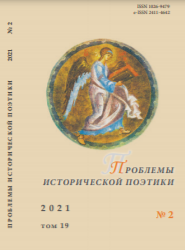Прецедентный интертекст в поэме «Великий инквизитор»
Precedential Intertext in the Poem “The Grand Inquisitor”
Author(s): Irina Vladimirovna DergachevaSubject(s): Christian Theology and Religion, Studies of Literature, Russian Literature, 19th Century, Eastern Orthodoxy
Published by: Петрозаводский государственный университет
Keywords: F. M. Dostoevsky; Gospel; precedent text; apocrypha; eschatological discourse; Grand Inquisitor;
Summary/Abstract: The poem “The Grand Inquisitor” is part of the novel The Brothers Karamazov, written by Ivan Karamazov about Christian freedom of will and told by him to his brother Alyosha, who rightly perceived it as an Orthodox theodicy. The article presents an intertextual analysis of the precedent texts used by F. M. Dostoevsky in the poem “The Grand Inquisitor.” Specifically, it interprets the meaning of direct quotations from the New Testament, especially its last book, the Revelation of John the Theologian, and the translated apocrypha “The Walking of the Virgin in Torment”; medieval Western European mysteries paraphrased by V. Hugo; poetic quotations from the works of A. S. Pushkin, V. A. Zhukovsky, and F. I. Tyutchev, which linked together the axiological concepts of the narrative text. Appeals to the precedent texts of world literature contribute to the disclosure of the poem’ multifaceted symbolism, which glorifies the human spiritual freedom as an act of faith, and helps generalize and deepen its axiological discourse. The author analyzes the speech and behavioral tactics of the Grand Inquisitor that are based on the equivocation typical of the “black rhetoric” techniques. In contrast to the Grand Inquisitor’s distortion of causal relations and the concepts of good and evil, and his denial of the idea of Christian freedom, direct and indirect quoting of texts that are a part of the world heritage creates a text rich in axiological meanings, designed to influence the reader’s spiritual space, enriching it and orienting it to the correct understanding of eternal truths.
Journal: Проблемы исторической поэтики
- Issue Year: 19/2021
- Issue No: 2
- Page Range: 125-140
- Page Count: 16
- Language: Russian

